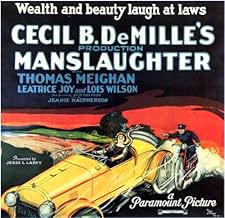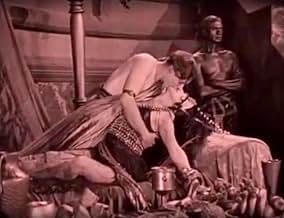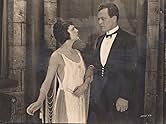Aggiungi una trama nella tua linguaThrill-seeking society girl Lydia causes a motorcycle policeman's death and is prosecuted by her fiancé Daniel, who describes in lurid detail the downfall of Rome. While she's in prison, she... Leggi tuttoThrill-seeking society girl Lydia causes a motorcycle policeman's death and is prosecuted by her fiancé Daniel, who describes in lurid detail the downfall of Rome. While she's in prison, she reforms and Daniel becomes a wasted alcoholic.Thrill-seeking society girl Lydia causes a motorcycle policeman's death and is prosecuted by her fiancé Daniel, who describes in lurid detail the downfall of Rome. While she's in prison, she reforms and Daniel becomes a wasted alcoholic.
- Regia
- Sceneggiatura
- Star
- Premi
- 1 vittoria in totale
- Dicky Evans
- (as Mickey Moore)
Recensioni in evidenza
It wasn't due to the lack of research in the preparation of the Jeanie MacPherson script, based on woman suffragette Alice Miller's 1921 novel of the same name. MacPherson wanted to experience the process being booked for a crime and living in jail as the protagonist, played by Leatrice Joy, had experienced in the story. DeMille approved of a scheme to have her get arrested for stealing a friend's fur, who was also in on the act, and be a prisoner for a few days. The police eventually found out about the ploy and released her. But the experience, details which were incorporated in her screenplay, jolted MacPherson so much she wrote an article titled 'I Have Been In Hell.'
So what makes "Manslaughter" so campy? The over-the-top dramatics of several actors, especially Thomas Meighan, the boyfriend lawyer of the carefree Lydia, is one whose dramatics is reminiscent of a bygone era. He sees his girlfriend headed down a slippery slope because of her wild behavior even before she accidentally kills a police officer during a high speed chase. He readily voluteers to be the prosecuting attorney charging her with manslaughter. His motive: to get her life back in order. After her conviction and imprisonment, Meighan displays such inner turmoil that one could see his neck blood vessels almost burst.
Even Leatrice Joy's performance is reminiscent of those seen in film during the early 1900's. The actress claimed she based her screen persona on attending a Los Angeles trial of a woman up for murder. But Joy's melodramatics carry such heady mannerisms that when someone showed the movie at her daughter's birthday 40 years after "Manslaughter" was released, the former actress "thought it was hilarious."
Of course, what would a DeMille movie be without a spectacular scene or two. In two fantasy sequences paralleling the plot, one has Joy overseeing an ancient Roman drunken fest where all participants are passed out, only to be intruded by aggresive barbarians. The other is a dream sequence where Joy shoots her boyfriend at a heavily-attended trial, sending the courtroom spectators scurrying around like disturbed ants.
Bacchannalian parties, which alternate between present and ancient Roman debauches, is a sure sign Cecil B. DeMille is directing. The O'Bannon character's flashbacks to ancient Rome are ludicrous DeMille indulgences. The better indulgence is the generous time DeMille's camera spends in a prison for women; his female prisoners are a lively bunch! The performances are sometimes entertaining, especially Joy and Wilson. Meighan starts off slow, but eventually succumbs to degradation. While fun is spots, this is NOT a great film. The love between Meighan and Joy is not particularly convincing; he shows more interest in Wilson, and might have been wise to run off with her. The story is sometimes inexplicable.
Symbolism likens a doughnut to a life preserver - so, why not a wheel? Coin collectors might enjoy the change in Meighan's pocket when he's down and out - two buffalo nickels and a standing liberty quarter.
***** Manslaughter (1922) Cecil B. DeMille ~ Thomas Meighan, Leatrice Joy, Lois Wilson
Other powerful means were also available to early cinema: just think of close-ups, or the expression of a face... Similar cinematic tricks were not possible in the theatre: they were some of the tools of cinema as a new means of expression, or - in rare cases - art.
Among the filmmakers, some realized it earlier, some later...
Leatrice Joy plays Lydia, a reckless playgirl, and Thomas Meighan plays O'Bannon, a principled district attorney. Lois Wilson adds support as Joy's maid, Evans, who steals Lydia's ring to pay for her son's medical bills. O'Bannon, who is in love with Lydia, prosecutes Evans, although Lydia promises to appear in court on her behalf. Instead, Lydia forgets all about her maid languishing in jail and awaiting trial, gets drunk, and has a hangover the day of Evans' trial. Evans is sent to prison. As Lydia is roaring down the street in her car (over 60 mph!!!), a habit of hers, a motorcycle cop pursues her (there is a subplot here, but not worth mentioning). Anyhow, the cop smacks into her car, and Lydia is charged with manslaughter. O'Bannon, thoroughly angry at Lydia by now, prosecutes her, and all of Lydia's legal tricks do not provide an escape from a prison sentence. Now Evans runs into Lydia in prison and Lydia continues to try and order Evans about like a maid! Evans has an appropriate reaction. But soon, Evans sees "the light", and so does Lydia. O'Bannon, distraught over sending his true love to jail, starts hitting the bottle. Will DeMille go for a happy ending? The acting is pretty good, and certainly less hammy than you would see in a typical DeMille flick.
Writer Jeanie Macpherson got onto a racetrack with a professional race car driver to experience what it would be like to drive at high speed (they hit over 100 mph), but it was Leatrice Joy who was stuck actually driving the car with the safety of the cameramen depending on her driving skills.
There is one weird aspect of this film, and that is the Roman orgy scene. This "flashback" occurs while O'Bannon is summing up his case against Joy. The scene is complete with tigers, gladiators, people prancing around in weird outfits, and, if my eyes did not deceive me, two women making out. Later, there is another "flashback," with Meighan in some weird barbarian garb dragging Joy up some steps with a whip around her hands. Apparently this was DeMille's way of saying the country was going to hell in a hand cart.
De Mille had gotten in trouble with what little film censorship existed in his earliest films for showing sexy drunken scenes, so he changed his formula to show the sexy drunken orgy scenes as some kind of moral comparison with a Biblical lesson and got away with it. At least until the actual production code came into force in 1934.
This film was remade as a talking film in 1930 with Claudette Colbert as Lydia with basically the same plot, but with no orgies this time. That wasn't really director George Abbott's cup of tea.
As one intertitle says early on: "Modern girls don't sit by the fire and KNIT." And so the leading character, played with great verve by Leatrice Joy (unknown to me), races, literally, to a huge dilemma. A man is killed, and a district attorney falls in love with the wrong woman. There are parties, and some hugely extravagant (for the time) scenes that director DeMille loved to stage. It's all kind of fun and the drama relatively dramatic. But none of it rises above. The conflicts are a bit drained of actual tension (partly the acting, partly the script) and the overall flow is surprisingly slow. The fun parts sometimes seem like interludes that may have once held their own, but no longer (and maybe not then, either).
I expected more, which is always a problem, but if you want to get into early DeMille, before he turned into a blockbuster hack, there are at least 10 other films I've seen (actually) that are much better. (Look for almost any drama between 1918 and 1921, a really fertile period for him and his loyal cinematographer, Alvin Wycoff.) As for the title, there might have been a great double entendré there, with both the man killed and the man in love, but it never quite gels.
Lo sapevi?
- QuizIn order to correctly write a script that would depict the experience of a woman being arrested and imprisoned, screenwriter Jeanie Macpherson arranged, at Cecil B. DeMille's behest, to be imprisoned for stealing a fur piece from a friend (with whom she had worked out an agreement beforehand). She was arrested in Detroit, booked and fingerprinted under the name Angie Brown and spent three days in jail before a police official discovered the truth and arranged for her release. Macpherson wrote about the experience in an article called I Have Been in Hell.
- Citazioni
Lydia's Chaperon: Make Dan keep an eye on her, Eleanor. If she will show up for anybody, she will for him - but as her chaperon, I won't stay and be party to such goings on!
- ConnessioniFeatured in Le Dee dell'amore (1965)
I più visti
Dettagli
- Data di uscita
- Paese di origine
- Lingua
- Celebre anche come
- Državni tužilac
- Luoghi delle riprese
- Azienda produttrice
- Vedi altri crediti dell’azienda su IMDbPro
Botteghino
- Budget
- 385.000 USD (previsto)
- Tempo di esecuzione
- 1h 40min(100 min)
- Colore
- Mix di suoni
- Proporzioni
- 1.33 : 1

























